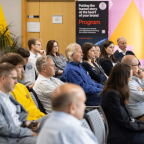
Andrew Dean, University of Exeter: Our universities can help drive sustainable growth and innovation in the tech sector
Dr Andrew Dean, Head of Regional Impact at the University of Exeter, shares his insight on the inaugural South West Tech Analysis Report and why our Universities can be key to seizing this opportunity.
About the University of Exeter and why we wanted to be involved
There are 169,800 students at the region’s 14 universities, including 19,500 tech and engineering students, but the talent pool will need to grow significantly to satisfy forecast growth, from entry-level to senior roles. The universities are central to the region’s research and innovation activity
The report rightly identifies that the region’s universities are key drivers of research and innovation, and involved in many of the South West’s major technology-focused facilities and hubs. At the University of Exeter we combine teaching excellence and high levels of student satisfaction with world class research at our campuses in Exeter and Cornwall.
At Exeter, Tech is already leading the way and delivering levels of growth not seen in other sectors and we recognise it can be the catalyst to helping us achieve our brand-new institutional priorities. Indeed, our new Strategy 2030 puts ‘place’ at the heart of our plans to deliver across three new priorities which will underpin all that we do:
-
Lead meaningful action against the climate emergency and ecological crisis.
-
Make key breakthroughs to transform human health and wellbeing.
-
Lead the progress towards creating a fair, socially just and inclusive society.
These are the university’s priorities and I suspect they are also not far from your own priorities.
You can see how we are taking some of these forward as part of our exciting Green Futures campaign, building on our position as home to many of the UK’s leading climate scientists, five whom are named within the top 21 globally.
As an institution we are developing the next generation of Environmental Intelligence scientists through research-led teaching in the UKRI Centre for Doctoral Training in Environmental Intelligence, and collaborate with world leading research organisations the Met Office, through the Joint Centre for Excellence in Environmental intelligence, and the Alan Turing Institute.
We are setting out our regional commitments through our new Civic University Agreements which will be target Education, Health, Innovation, Net Zero and Culture.
Skills will be pivotal if we are to seize this opportunity
The Report rightly identifies that the South West is prospering in terms of its economic activity. The region is home to 8% of the UK’s population and 9% of its workforce. However, in the tech sector, demand continues to outweigh supply, a challenge that is reflected nationally. In the South West, tech job vacancies rose 12% in June 2021 alone, contributing to the inflating tech salaries in the South West of 4.5% between 2020 and 2021. Clearly our universities have a role in ensuring our courses help meet this need, working closely with employers and our regional partners.
I’ve spent much of my working life in the field of ‘skills’ and for the early part of that - universities were somewhat peripheral – providing intelligent and ambitious young minds for employers with little other commitment. We recognise that many still see this a our major ‘offer’, but graduate retention is only a part of what we currently deliver.
Many thousands of our students work or take placements in local and regional businesses – including for example, supporting small businesses as Green Consultants – who offer employers the opportunity to work with inspired University of Exeter students, keen to start their careers in the environmental and sustainability sector.
As an institution we are proud to be a standard-bearer for Degree Apprenticeships, which offer an innovative and cost-effective way of attracting and retaining high-calibre employees and graduates to your business. Our innovative Degree Apprenticeship programmes are built to train the next generation of industry-focused graduates. We work in collaboration with employers to shape programmes that meet specific business needs. Our current Degree Apprenticeship offer includes:
Undergraduate
Digital and Technology Solutions (BSc)
Civil Engineering (BEng)
Diagnostic Radiographer (BSc)
Diagnostic Radiographer (MSc)
Financial Services Professional (BSc)
Chartered Manager (BSc)
Postgraduate
Research Scientist: Data Science Professional (MSc)
Systems Thinking Practitioner (MSc)
Advanced Clinical Practitioner (MSc)
Clinical Associate in Psychology (MSc)
Senior Leader (Healthcare)
Senior People Professional (MSc)
Five years ago we created the Exeter Data Analytics Skills Escalator – a means of mapping and understanding what data science skills local employers needed, where current delivery existed and where the gaps were – enabling the development of a major series of investments in new Degree and MSc courses in Data Science alongside many other new developments. We continue to build on this model with new courses, centres, institutes and programmes.
Notable other skills interventions include our role in the South West Institute of Technology (SWIoT) which is a unique collaboration between a number of partner organisations, each investing in the development of state-of-the-art facilities for training Britain’s next generation of highly skilled technicians and engineers. Through SWIoT we recently delivered a new course for Centrica on Heat Pumps.
We are also seeking to make a step-change in the amount of Professional Education we offer to the region and further afield, building on a considerable offer already being delivered through our Business School and College of Medicine and Health.
Our Tech commitment to the region
The Tech SW Report recognises the need to demonstrate to Tech companies the opportunities and benefits of partnering with universities to build a talent pipeline. It also emphasises the importance of collaborative research and innovation projects in developing the South West’s competitive advantage in key tech specialisms.
SETsquared is an excellent example of the added-value universities can bring. It is an enterprise partnership comprising of leading universities (Bath, Bristol, Exeter, Southampton, Cardiff and Surrey) has secured funding from the Government’s innovation agency and Innovate UK to help accelerate the growth of tech firms in the region. The funding will also help run the Regional Angel Investment Accelerator (RAIA) initiative, which should boost the start-up ecosystem. SETsquared is a tech incubator, rather than a university incubator, and caters for scaleups and larger firms as well as start-ups. As a region we should seek to utilise Levelling Up opportunities to ensure this kind of business support offer is more widely available across the region.
Diversity remains, rightly, a concern for the sector. At Exeter we are proudly championing diversity through routes such as Athena Swan which tackles gender disparity in our sector and are awaiting the result of our recent application for a Race Equality Charter Mark. As an institution we are applying be Disability Confident and submitting to the Stonewall Workplace Equality Index.
Finally, two examples of work planned here at Exeter:
-
As an institution we are looking to launch a Net Zero Plus Innovation Hub for the South West, supporting regional businesses and organisations with their climate and environment action plans. Through this we will attract start-ups and entrepreneurs to the region, providing skills development for green and digital transformation and building the South West into an international leader in climate action, biodiversity and natural capital.
-
This will also be a major year for Spaceport Cornwall and we are working with the Satellite Applications Catapult to explore downstream opportunities for local businesses and innovators.
Recognise our world-beating Tech specialisms
The South West Tech Analysis Report recognises that we have particular sectors and clusters where we are truly global leaders. Whether Environmental Intelligence in Exeter, Marine in Plymouth or Photonics in Torbay – all are very much part of the Tech success story. These offer us real potential for delivering the ambitions set out in the report.
We need to make sure that the South West Tech Analysis Report is the start of a region-wide collaboration and I am confident that our universities can play a full part. As universities we must ensure more tech firms, including smaller companies, can interface and benefit. Achieving this will be central to how we can help the sector move forward.
Download the South West Tech Analysis Report at https://www.techsouthwest.co.uk/regional-report-2022







